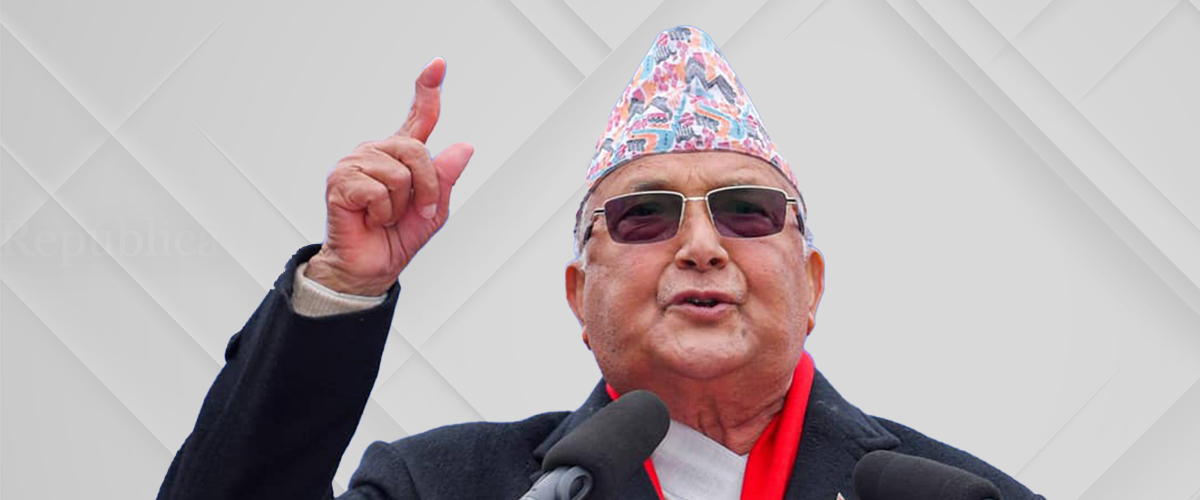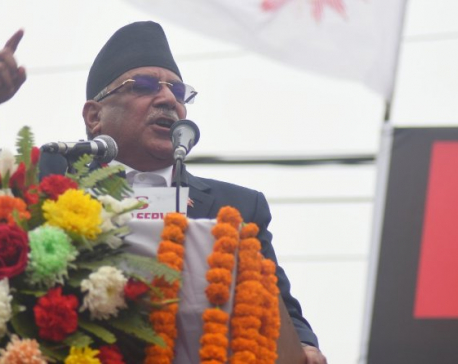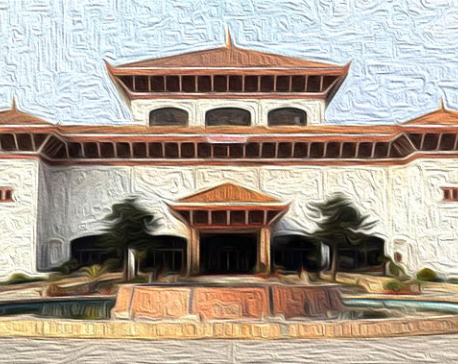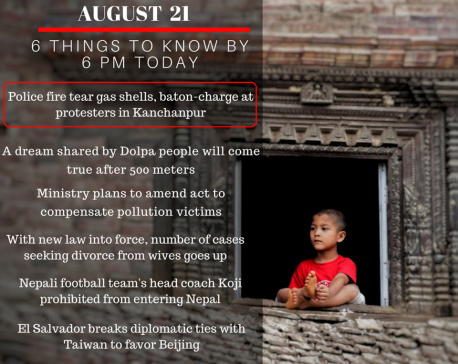
OR
News Analysis

With elections on his mind, PM Oli seeks a vote of confidence in parliament
KATHMANDU, May 4: Prime Minister KP Oli sent ripples across the political circle in Nepal when he announced to seek a vote of confidence in the lower house of the federal parliament. President Bidya Devi Bhandari has already summoned a special session of the House of Representative (HoR) for May 10 as per the recommendation made by Prime Minister Oli. Since there are doubts whether the lawmakers close to the Madhav Kumar Nepal-led faction of the ruling CPN-UML will vote in favor of Oli while the Janata Samajbadi Party still remains sharply divided to extend him support, the attempt of Prime Minister Oli, who remains unchallenged in parliament so far, has left many ask a question: why is Prime Minister Oli risking his position?
Prime Minister Oli's attempt to prove his majority in parliament seems to be guided by one principle: hold the next election-- be it mid-term or parliamentary election -- under his leadership after the term of current parliament expires.
Leaders close to him say Prime Minister Oli will seek to garner majority votes in parliament. If he succeeds in doing so, he will have a chance to hold the next election under his leadership one and a half years later. But in case he is not able to secure majority votes in parliament, Prime Minister Oli will try to make sure that his rival parties in parliament cannot secure majority votes even to form a simple majority government. This will again pave the way for him to hold mid-term elections under his leadership by dissolving the current parliament.
Mathematical equation in parliament
Let's look at the mathematical equation in parliament. Four seats in the 275-member parliament have been lying vacant since the Maoist Center decided to sack four of its lawmakers following their decision to join the CPN-UML and four other lawmakers are under suspension for various reasons. Since the number of lawmakers that is counted for majority is 271, a prime ministerial candidate needs to garner support of 136 lawmakers.
The ruling CPN-UML alone has a total 121 lawmakers. While the main opposition party, Nepali Congress (NC) has 61 lawmakers, the Maoist Center has 49 lawmakers. Similarly, Janata Samajbadi Party (JSP) has 32 lawmakers and Nepal Workers' and Peasants Party, Rastriya Prajatantra Party and Rastriya Janamorcha Party each have one lawmaker in parliament.
Given the intra-party rift reaching its peak in the UML, Prime Minister Oli is not sure if all the UML lawmakers close to the Madhav Kumar Nepal-led faction will cast their votes in his favor. He has already sought clarification from 30 lawmakers close to the Nepal-led faction. Even if they cast their votes in his favor, Oli will still run short of 15 votes to prove his majority in parliament. Prime Minister Oli is personally involved in negotiations with the JSP leaders Mahantha Thakur and Rajendra Mahato.
However, the JSP remains sharply divided over whether to seek continuity of Oli as the prime minister. While senior leaders Upendra Yadav and Dr Baburam Bhattarai are opposed to supporting Oli, Thakur and Mahato are in favor of supporting Oli for what they describe as “fulfilling the demands raised by the party for long”. The Oli-led cabinet recently decided to withdraw 15 cases filed against 120 leaders and cadres belonging to the party in the course of Madhesh movement in an apparent bid to solicit the support of the JSP. Although it is not clear how many lawmakers the two factions in the party have on their sides, the party insiders believe that Thakur and Mahato have the support of around 16 of the total 32 lawmakers of the party. A horse-trading of a few lawmakers cannot be ruled out as the voting in parliament draws nearer.
Oli in mood to go to midterm elections if no majority votes
The UML insiders, however, claim that Oli is not in mood to make undue efforts to save his government even as he will attempt to seek majority votes in parliament. He is mentally prepared to go for an early election for two main reasons: first, this will justify his 'unconstitutional move' to dissolve parliament on December 20 and announce a fresh election. The move was later overturned by the Supreme Court. Second, Oli believes that this is the most opportune time for the UML to go to elections as the rival parties stand relatively weaker. While NC will be fully engrossed in its upcoming 14th general convention, the organizational base of the CPN (Maoist Center) and Janata Samajbadi Party is very weak at present. Despite the intra-party rift, leaders close to Oli believe that the election symbol - Sun - will still help them to achieve victory. The Madhav Kumar Nepal-led faction of the UML will have to form a new party with a new election symbol if they decide not to stay with the UML.
Political observers argue all the activities of Oli after the reinstatement of parliament are targeted at new elections. Prime Minister Oli inaugurated the Melamchi Drinking Water Project, the newly-built Dharahara although much work is still left to be completed. While he laid the foundation stone of the Sunkoshi-Marin Diversion Project, the prime minister is also scheduled to inaugurate the Upper Tamakoshi Hydropower Project soon. The prime minister has already announced to increase social security allowances and promised to hike the salary of civil servants and daily wage workers. All these moves of Prime Minister Oli are aimed at giving the impression to the people that he is the one to work for the cause of the people and expedite development works in the country. UML insiders believe these all will likely drive the party to a victory in the elections.
UML's Nepal-led faction still a decisive force
How the political course in the country will move ahead will now largely depend on the decision that may be taken by the Madhav Kumar Nepal-led faction of the UML. If the Nepal-led faction decides to vote for the Oli-led government, the Oli-led government will continue for the next one and a half years until fresh elections. But if the faction decides not to vote in favor of Oli, the scenario will be different. The opposition parties -- NC, Maoist Center, and Yadav-Bhattarai-led faction of the JSP- will have a total 126 lawmakers. The rival faction will still require at least 10 more votes to oust Oli from power. The only hope for the rival faction to form a new government is possible with the support of lawmakers close to the Madhav Kumar Nepal-led faction of the UML. But Prime Minister Oli has already sought clarifications from 30 lawmakers close to the Nepal-led faction of the UML fearing that they may choose to cross floor in parliament as they did in Karnali Province. Prime Minister Oli, who is also the parliamentary party leader of the party, may choose to suspend them from their posts if there was credible information that they are crossing the floor in parliament. The Oli-led UML will still be the largest party in parliament even if Oli takes action against all those asked to furnish clarification and President Bidya Bhandari may ask Oli to form a new government in his capacity as the largest party leader in parliament as per the provisions in the constitution. Prime Minister Oli will eventually announce a midterm election for a fresh mandate.
The lawmakers close to Nepal may also have the option to resign en masse in that case, paving the way for the opposition parties to have a majority in parliament to form a new government. If 30 lawmakers close to the Nepal-led faction resign en masse, the existing strength of parliament will be 241 and the opposition parties can form a new government with only 121 seats in parliament. Whether the Nepal-led faction will choose to take such an extreme measure to topple the government led by its own party and help opposition parties to form a new coalition government is easier said than done.
You May Like This

PM Oli does not have moral ground to seek vote of confidence: Dahal
KATHMANDU, May 10: Chairman of CPN (Maoist Center) Pushpa Kamal Dahal has said that Prime Minister K P Oli does... Read More...

Corona-infected lawmakers, too, can cast their votes as PM Oli seeks vote of confidence in parliament tomorrow
“Voting procedure will complete on Monday itself” ... Read More...

Aug 21: 6 things to know by 6 PM
Your daily dose of missed important news of the day. ... Read More...




Just In
- Govt receives 1,658 proposals for startup loans; Minimum of 50 points required for eligibility
- Unified Socialist leader Sodari appointed Sudurpaschim CM
- One Nepali dies in UAE flood
- Madhesh Province CM Yadav expands cabinet
- 12-hour OPD service at Damauli Hospital from Thursday
- Lawmaker Dr Sharma provides Rs 2 million to children's hospital
- BFIs' lending to private sector increases by only 4.3 percent to Rs 5.087 trillion in first eight months of current FY
- NEPSE nosedives 19.56 points; daily turnover falls to Rs 2.09 billion















Leave A Comment